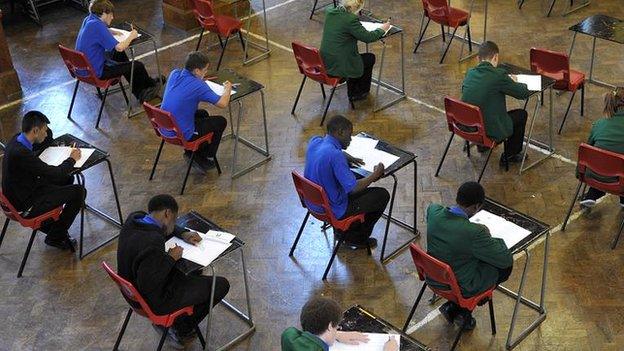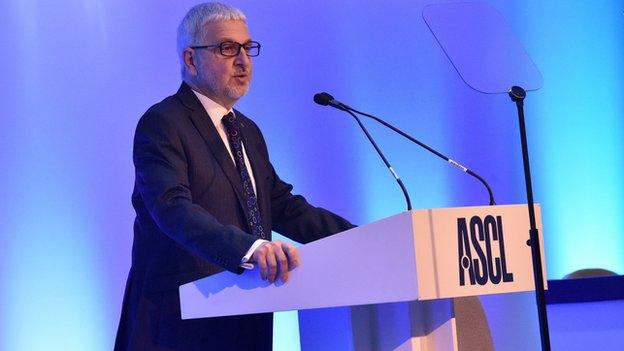Is the cost of exam re-marking putting off state schools?
- Published

More than 77,000 A-level and GCSE grades were changed on appeal last summer
The stakes are high for getting the right exam grades. For pupils it can mean the difference between gaining or missing out on a university place. For a school it can mean changes in league tables.
But what happens if there are doubts over the accuracy of the marking?
Last week, private school head teachers launched a scathing attack on the exam marking system, accusing it of too often delivering "frankly unbelievable marks or grades".
This is likely to be pursued by the education select committee on Wednesday, when MPs examine the homework of the exam regulator, Ofqual.
What has come under less scrutiny is the spiralling cost of this uncertainty about marking. And there is evidence that this cost is becoming an unequal barrier.
Schools and parents have to pay to get papers re-marked, with the fee waived if the grade is changed.
There has been a remarkable increase in people questioning their exam results, surging by 118% between 2010 and 2014.
Private school advantage
It means rising numbers have faced a complex menu of charges, depending on the urgency, qualification, exam board and whether it's a full re-mark or a "clerical check".
It could be about £33 for re-marking a non-priority GCSE paper or more than £60 for an urgent re-mark with a copy of the script of an A-level paper. And it can be paid by schools, or parents might be asked for a payment.

A grade gained or lost could affect a university place
There is no official total figure for how much of the education budget is now going to exam boards for re-marks.
But looking at fee levels and the number of papers per board, it seems that exam boards received more than £10m in fees last year. AQA on its own says it received £4.7m in re-marking fees from last summer's exams.
Was this money well spent?
With almost one in five appeals resulting in a grade change, it's not a bad hit rate. But is this second chance giving some pupils an unfair advantage?
The exam regulator Ofqual says it does not know whether it is state or private pupils seeking re-marks. But the OCR exam board, from its own data, has revealed its own "simple breakdown".
It shows that independent schools accounted for 23% of inquiries, while they represent 15% of exam centres. That suggests that independent schools were disproportionately likely to challenge grades.
Social mobility
This supports the views of head teachers.
Brian Lightman, head of ASCL, says: "Clearly many independent schools can afford to submit large numbers of re-marks whereas some state schools will struggle financially. Parents often pay for them."

Brian Lightman says state schools can "struggle financially" with the cost of re-marks
"Having exam papers re-marked carries a cost for schools in terms of both time and money. Those with more of both can afford to challenge the marking on more papers. This is unfair," says Russell Hobby, leader of the National Association of Head Teachers.
Deborah Streatfield of the careers' advice charity MyBigCareer says: "This imbalance does nothing for social mobility."
The big question raised is whether there are state school pupils who are not getting their exam papers checked, who might otherwise have had their grades improved.
The number of grades found to be incorrect has risen alongside the rising number of inquiries. Does that mean that more re-marks would mean more changes?
An AQA spokesman says: "We only charge when a review shows there was nothing wrong with the original marking, so we hope this encourages any schools with concerns about grades to get in touch."
Rising fees
Parents and schools, facing the bill for re-marks, will see how much the costs vary between exam boards.

Exam results can be good news, but there can be anxious times if results are not what was expected
Exam boards, which receive millions from re-marking fees, can decide how much they charge.
Edexcel charges £23 for a non-priority GCSE re-mark, while OCR charged £39.30 last year, £42.50 this year and will charge £44.90 next year.
OCR and AQA both have charitable status, but charge more than for-profit Edexcel.
A spokesman for OCR says: "We incur significant costs with a review of marking and most result in no change to marks at all. What we charge is designed to cover our costs and no more than that."
An AQA spokesman says "any money we make either funds major programmes like our new reformed qualifications - or charitable work", such as a mentoring project or research into improving assessment.
Marking quality
But what should be done about this rising tide of appeals?
Ofqual's outgoing head, Glenys Stacey, says that in the context of all the grades awarded annually, only about 1% are changed.

How one state secondary school experienced this summer's exam re-marking:
75 appeals against results
21 appeals resulted in a higher grade
All changes were upwards and by one grade, such as B to A
Cost was about £3,500 with £800 waived for changed grades
School had 'key upgrades' in performance table, individual pupils 'clearly benefit'

Speaking this week, she said there had been research into using double marking, but that would cost up to £10m and there was no evidence that it would perform any better than the current system.
Ms Stacey also discounted higher pay for markers as a way of improving accuracy, but suggested technology could be increasingly used to monitor the quality of marking.
But the underlying issue here is the rising numbers wanting to challenge exam grades.
The AQA exam board says it has been driven by changes to the A-level and GCSE system, such as putting more emphasis on final linear exams and reducing the opportunity for re-sits.
But head teachers are more likely to point to persistent doubts over the reliability of the marking system. It's only a couple of years since a battle over GCSE results reached the High Court.
"Many schools have found the results of individual pupils difficult to explain," said Mr Lightman.

The exam system is creaking badly ! I am a marker and have taught for over 20 years . Pressure of marking deadlines , the abandonment of face to face moderation meetings for a watered down online version with meeting the examiner has had a huge impact . Team leaders due to time constraint are often retired , are part time or haven't taught the exam specification they are examining ! Some are very inexperienced teachers ! These are the reasons for poor standards , that and the pitiful remuneration and lack of recognition professionally that you give your time to mark and enhance your understanding of the paper. Exam boards struggle to attract markers pure and simple . A massive change is needed. Richard, Stamford.
Unfortunately our family has had more than one problem with incorrect results. The worst was... a 10 point error. This not only kept my daughter out of university for a year but cost us an additional £ 22,000, as it was the year of the fee increase. At the time I contacted Ofqual and the Minister of Education everyone was very polite but no one cared. Exam boards do not take the blame for the damage they cause and the government does nothing about it. Things need to change. Kimberley, Ascot
We have had surprisingly low results in several subjects, leading us to request re-marks. These have all resulted in significant improvement in marks and grades overall. We are currently waiting for the results of a re-mark of one unit of our entire GCSE Spanish cohort (83 students). Debbie, Wadebridge
The system is unfair in another point. They refund you the cost if there is a change in the mark, but they don't acknowledge that with 1 in 5 challenged marks finally changing, they create distrust in the system and become the cause for more remark requests. Andreas
My daughter has just received the results of a GCSE re mark enquiry - she was 1 mark below the total grade boundary for an A* in English Literature (179 - the boundary was 180 split over 2 written papers and a controlled assessment), the exam board was WJEC although her school also used OCR for other subjects. We asked for 1 paper to be re marked at a cost of £35 and hoped they would be able to find the 1 mark she required for the upgrade. In fact they found 7 marks, pushing her grade over into the A* boundary. Whilst this was great news, my daughter is now wondering whether the subjects she was less successful with, i.e. scoring 5 marks or so below grade boundaries, were under marked as well? Her results, although very good, could have been excellent and now we will always be left thinking 'what if...?' If this has happened at GCSE, what will happen at AS and A2? That grade could have made a huge difference to her future especially when competition for University places is so fierce. Christiana, Leicestershire
As someone who has marked exams for the past 16 years and A level exam scripts this year and also carried out a small number of re-marks, there are a number of issues.
Firstly, there is a culture of non-failure. I have read some truly amazing exam scripts, but I have also read some appalling ones. The issue is that most candidates fall in the middle of the traditional bell curve. However, with schools more concerned with league tables, with learners now more like consumers with a right to pass, and government constantly tinkering with the syllabi, it's no wonder there is disarray.
Secondly, the scheduling of exam marking and moderation meetings is appalling. 3 weeks to mark 150 scripts, do them justice and apply what are at best descriptive mark schemes just isn't long enough. I have no problem with final exams and feel the over-reliance on coursework previously, which it is obvious some teachers kept supporting through several drafts, is something I am glad has gone. However, the exam scheduling, moderation meetings, final deadlines and time to mark all need looking at. I'd happily mark exams full-time, but at present it is only for 3-4 weeks per year of intense activity and pressure which is bound to lead to some mistakes.
Thirdly, the remuneration for marking scripts is pitiful. If schools and parents are so concerned about exam marking standards perhaps they need to be aware that each script marked is paid a flat rate. This varies according to whether it is GCSE or A Level and the amount of interpretation of the mark scheme. I was paid £4.69 per A Level script - a lot less than the hourly minimum wage rate. So when people are complaining about the standards of marking and wondering why exam boards can't recruit markers, perhaps they should bear this in mind. As many markers are those who teach the subject or have taught it and give up effectively 3 weeks or more of their summer vacation to mark, is it also any wonder why this isn't attractive. I am lucky. I have a good job and don't get school holidays, so for me it is more challenging to mark the scripts due to time constraints, but I don't do it to make lots of money. I do it because I love my subject and I want to read exam scripts and credit young people who have learned their subject.
So when everyone has finished putting the boot into exam markers, their standards and whether or not the system is working, all I can say is that those of us in the system trying to make it work at the coal face are doing our best in very difficult circumstances. There do need to be changes, but as usual with the BBC the issue is far more complex than their simple dichotomy of it's unfair to state schools as they can't afford to challenge results. Amanda, Warwickshire
I have challenged the grades of my exams in the past and the idea that I pay £33 for the mistakes of inexperienced markers is sickening. Daniel, Selby